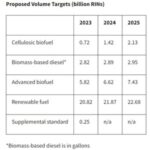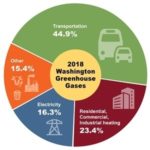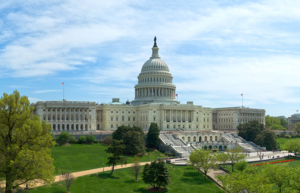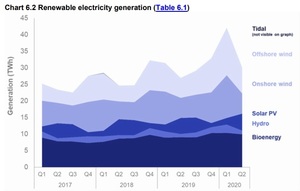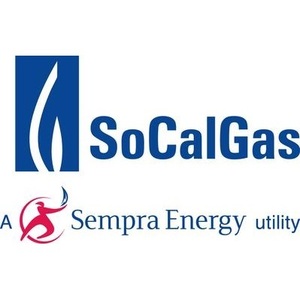Biofuel groups testify in support of a strong RFS
Energy Disrupter
ADVERTISEMENT
Representatives of the biofuels industry called on the U.S. EPA to set strong Renewable Fuel Standard blending requirements and abandon plans to retroactively reduce the 2020 renewable volume obligation (RVO) during a Jan. 4 hearing held by the agency to gather public comments on its pending proposed rule to set 2020, 2021 and 2022 RFS RVOs.
The agency on Dec. 7 released a proposed rule that aims to revise the 2020 RVO and set long-overdue RVOs for 2021 and 2022. A public comment period on the proposed rule is open through Feb. 4.
For 2020, the EPA is proposing to reduce the total RVO for renewable fuel to 17.13 billion gallons, down from 20.09 billion gallons as finalized in late 2019. The nested RVO for advanced biofuel would be set at 4.63 billion gallons, down from 5.09 billion. The RVO for biomass-based diesel would be maintained at 2.43 billion gallons, while the cellulosic biofuel RVO would be set at 510 million gallons, down from 590 million gallons. The agency said it is proposing to revise 2020 RVOs to account for challenges the program and the market faced during the year, including from the COVID-19 pandemic.
For 2021, the EPA is proposing to set the RVO for total renewable fuel at 18.52 billion gallons, including 5.2 billion gallons of advanced biofuel, 2.43 billion gallons of biomass-based diesel, and 620 million gallons of cellulosic biofuel. The EPA said the 2021 RVOs are being proposed at the level the agency projects the market will use by the end of this year.
For 2022, the EPA is proposing to set the RVO for total renewable fuel at 20.77 billion gallons, including 5.77 billion gallons of advanced biofuel, 2.76 billion gallons of biomass-based diesel, and 770 million gallons of cellulosic biofuel. The agency is also proposing to add a 250-million-gallon supplemental obligation and has stated its intent to add another 250-million-gallon supplemental obligation in 2023. The supplemental obligations would address the remand of the 2014-2016 annual rule by the D.C. Court of Appeals in Americans for Clean Energy v. EPA. The agency said spreading the obligation over two years would provide the market time to respond to the supplemental obligation.
In its testimony, the Renewable Fuels Association said the EPA is moving in the right direction on the RFS, but urged the agency to reconsider the proposed retroactive cuts to the 2020 RVO.
“RFA supports the proposed volumes for 2022 for all categories of renewable fuel, and we specifically commend EPA for proposing to set the implied requirement for conventional renewable fuels at the statutory level of 15 billion gallons,” said Geoff Cooper, president and CEO of the RFA. “We also support EPA’s proposal to account for projected exempt volumes from small refineries when setting RVO percentages. And, RFA agrees with EPA that, ‘in the interest of transparency,’ the agency should release basic information about entities seeking exemptions from RFS compliance.” Cooper also voiced RFA’s strong support for EPA’s related proposal to deny 65 pending small refinery exemption petitions.
Unfortunately, however, EPA’s proposed RVO for 2021 misses the mark and the proposed retroactive revision of the 2020 RVO would set a “dangerous precedent,” Cooper said.
“As for the 2021 RVO and the proposed revision to the 2020 RVO, we have serious concerns about EPA’s questionable use of its ‘reset’ authority,” Cooper said. “While we understand EPA has a statutory obligation to consider resetting future RFS volumes when certain thresholds are met, it does not appear that Congress intended for EPA to use its reset authority for the purpose of retroactively addressing unforeseen market anomalies like COVID or weather-related disasters.”
The American Coalition for Ethanol is encouraging the EPA to revise its RFS proposal to support the statute and the nation’s decarbonization goals.
Testimony offered by Brian Jennings, CEO of ACE, highlights how refiners lull EPA into helping them escape their legal responsibility to blend increasing volumes of renewable fuel. When viewed in isolation, certain provisions in the proposal are a positive shift away from EPA’s prior mismanagement of the RFS, but the proposal in totality neglects to emphasize the role grain-based ethanol can play in helping meet the administration’s decarbonization goals, according to ACE.
ACE also applauded EPA’s proposed a statutory 15 billion gallons for 2022 and the agency’s plan to remedy the 500 million gallons in remanded volume by the DC Circuit Court in 2017. However, ACE strongly opposes EPA’s proposal to retroactively waive 2020 volumes and reduce 2021 volumes. As currently drafted, the proposal does not guarantee 15 billion gallons of low carbon ethanol will be used in 2022, the group said.
“… EPA’s ongoing obsession with maximum compliance flexibility for refiners means excess RINs can be used to meet future obligations instead of the physical blending of E15 and higher blends,” Jennings stated in his testimony.
The testimony also notes the legal dubiousness of retroactively and gratuitously reducing 2020 volumes below actual use. “This approach essentially shifts more of the pandemic burden from refiners to ethanol producers and farmers by allowing gallons already sold to be counted against 2022 volumes,” Jennings explained.
Growth Energy said the proposed RVOs would undercut blending requirements for 2021 and criticized the agency’s plan to retroactively reduce the 2020 RVO.
“During the previous administration, the small refinery exemption program undercut the goals of the RFS, preventing EPA from ensuring the RVO was met each year,” said Emily Skor, CEO of Growth Energy. “We appreciate the agency’s work to end this abuse and return to a true implied conventional volume of 15 billion gallons in 2022, along with promoting strong growth in advanced biofuels. We are also pleased that the agency has finally proposed to restore the first 250 million gallons illegally waived in the 2016 RVO with a commitment on the second 250 million gallons for 2023.
“EPA’s proposal, however, has some serious flaws that need to be addressed. It sets an extremely troubling precedent of revising finalized volumes for 2020 and back-setting volumes for 2021 rather than driving growth in renewable fuels,” Skor continued. “The proposed retroactive cuts to 2020 exceed EPA’s legal authority, and negatively impact the entire agriculture and fuel supply chains.
“EPA should return integrity to the RFS program and remove hurdles to the use of higher biofuel blends as follows:
“First, leave 2020 RVOs as finalized in 2019, set the conventional 2021 and 2022 RVOs in line with the statute, and finalize the rulemaking as expeditiously as possible,” she added.
“Next, EPA should move quickly to finalize its proposed denial of pending small refinery exemptions.
“The Biden Administration simply cannot meet its climate goals without strong blending requirements for low-carbon biofuel. But if the administration enforces the RFS as promised, it can be a powerful tool for keeping America on the path to a net-zero emission future,” Skor Said.
The National Biodiesel Board welcomed the proposed growth in the 2022 RVO and urged the EPA to maintain the integrity of the RFS program and avoid further or future delays in setting annual RVOs.
Donnell Rehagen, NBB’s CEO, highlighted the clean fuels industry’s readiness to meet higher volumes and thanked EPA for restoring improperly waived volumes from 2016. “During these past two years, the biodiesel industry worked hard to meet Americans’ growing demand for better, cleaner fuels,” Rehagen testified. “In 2020, the U.S. biomass-based diesel and renewable diesel market grew to 3 billion gallons – its highest volume ever – and generated more than 4.5 billion advanced biofuel credits. Through the first 11 months of 2021, the industry has maintained a sustainable production rate comparable to 2020.”
Kate Shenk, NBB’s director of regulatory affairs, also welcomed proposed growth in 2022, adding, “We want to ensure that the BBD volume is fully met each year and continues to reflect growth in biomass-based diesel production. We also hope that EPA continues to create room for growth in the overall advanced pool, since some additional advanced biofuels are co-products of biomass-based diesel.”
NBB and its members also emphasized the uncertainty created by EPA’s proposed reset of 2020 volumes and proposed – rather than outright – denial of small refinery exemptions. “Today’s proposal – while positive for future years’ growth – continues to undermine the industry and bow to the pressures of the refiners,” said David Cobb, NBB’s director of federal affairs. “The fact that this proposed rule opens another comment period for SREs just adds additional delays in finalizing a rule that is already late.”
NBB further urged EPA to quickly propose 2023 RFS volumes, which were due under the statute on Nov. 30, 2021.
The Iowa Renewable Fuels Association said the EPA’s plan to retroactively reduce the 2020 RVO would set a dangerous precedent.
Monte Shaw, executive director of the IRFA, applauded the EPA’s plan to restore the 500 million gallons of conventional biofuels illegally cut from the 2016 RFS rule, but criticized the agency’s proposed reduction of the 2020 RVO. “On one hand the proposed rule restores integrity of the RFS law itself, while on the other hand, the proposal would leave the annual RFS rules on shifting sand, unable to be trusted,” he said.
“Some say I should focus on how the proposed rule gets the RFS back on track for 2022,” Shaw added. “Really? How would I know? Under the precedent proposed today, this rule, which will be ‘finalized’ in a few months, could be reopened in a year or two by the EPA and the RFS levels could be reduced citing ‘reset’ or ‘set’ or some other authority. If I can have no confidence in the 2020 final rule, why should I put any confidence in the proposed 2022 numbers?”
Shaw urged the EPA to reconsider the proposed changes to the 2020 RVO. “You have the ability to set the RFS on a solid foundation going forward. Restoring the 2016 gallons is a positive step in that direction. But reopening the 2020 rule would rip apart the credibility of the RFS just like the 2016 rule,” he said.
Written comments on the EPA’s proposed rule to set RVOs for 2020, 2021 and 2022 can be filed through Feb. 4. Additional information is available on the Federal Register website.



